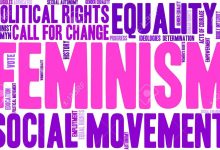
|
Getting your Trinity Audio player ready...
|
“Is this the attitude you’re taking to your husband’s house?”
“Sit properly, you’re a woman.”
“Every boy in this class should hide his head in shame. How can you allow girls to be the top performers?”
“Why is she coming out to speak now about her sexual harassment experience? She wants to ruin a good man’s life! What was she wearing? Maybe she was encouraging his advances.”
These words, and more, in different variations, are not new to the average Nigerian girl. Catcalls are the order of the day on the streets, harassment in marketplaces, and groping at parties. Domestic violence is as pervasive as boreholes in households and femicide, as commonplace as nightlife in beer parlours. The maternal mortality rate in the country is the fourth highest in the world; child brides numbering over twenty-four million, and a record figure of sixty-two per cent of women in poverty.
This is the grim reality of women’s lives in Nigeria—beyond the prism of individuality and privileged experiences—without taking into context the imposition of traditional cultures and limitations of the constitution on their rights. As such, feminism would be very much instrumental, indispensable, sacrosanct, and realistic in Nigerian society.
Why feminism? And what is it?
The consolidated political, social, economic, individual, and other forms of well-meaning efforts towards ameliorating or eliminating one or all of the (adverse) occurrences as listed above, and more is feminism. It is both a theoretical and practical approach because the treatment of women as contemptible, othered—bordering on second-class—beings in Nigerian society is manifest in both beliefs and actions that co-create and are dependent on each other.
Identifying a problem and whom it concerns or affects, as the case may be, is central to (effectively) addressing and combating it. This is a given in every area of function in society, and it is no different with the feminist movement. Thousands of causes, belief systems, organisations and movements exist—from the charismatic to institutional—all through ages, set up to meet humans’ holistic needs.
Feminism is uniquely and exponentially influential in the sense of its purpose and perspective. It is by women and, for women, the other sex of the human species, collectively making up half of the human race worldwide. This scope of influence is both encompassing and binding. It not only allows for a range of experiences and views by women, but it makes women’s voices and interests central. As such, this negates the need for “hundreds” of “breakaway” feminism or the encroachment of non-vested parties. This, however, does not mean that other movements and causes, such as egalitarianism and humanism, cannot or should not exist separately outside of feminism.
That women are seen as an inferior class of humans – biologically, psychologically, physically, socially, even spiritually, in some instances, underscores the necessity for feminism. The overarching system responsible for this classification is referred to as patriarchy (some may argue that it doesn’t exist anymore, erroneously assuming that it’s been watered down by the interplay of various modern phenomena such as capitalism and postmodernism, but the numbers and feelings don’t lie). Patriarchy, in its simplest meaning, is male rule. From the private to public sphere. The veneration and accordance of superiority to men.
Assumptions such as a man being a natural leader or that girls “rot” more than boys are some “symptoms” of this system.
Since the patriarchy is one dominant, universal system, even as it manifests differently in most countries, it behoves that feminism should be one. Of all “types” of feminism, the one kind of feminism that acknowledges the universality of women’s ascribed status is radical feminism. There exists no eco-patriarchy, traditional patriarchy, liberal patriarchy, classical patriarchy, or manism.
The one shared basis of women’s ascribed status through all ages and cultures is sex. The fact of being born female predates every and any other form of -isms or intellectual perspectives or modern political systems.
Any effective approach to women’s liberation, therefore, must start from the basic basis of sex or at least acknowledge it. This is why radical feminism is a tautology; it is feminism in its basic and simplest form. For us to ensure women’s liberation from male oppression, we must all align with the movement accordingly.






